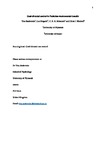Goal-directed control in Pavlovian-instrumental transfer
| dc.contributor.author | Seabrooke, T | |
| dc.contributor.author | Hogarth, L | |
| dc.contributor.author | Edmunds, CER | |
| dc.contributor.author | Mitchell, Chris | |
| dc.date.accessioned | 2018-10-02T19:24:57Z | |
| dc.date.issued | 2019-01-04 | |
| dc.identifier.issn | 2329-8464 | |
| dc.identifier.issn | 2329-8464 | |
| dc.identifier.uri | http://hdl.handle.net/10026.1/12442 | |
| dc.description.abstract |
The current article concerns human outcome-selective Pavlovian-instrumental transfer (PIT), where Pavlovian cues selectively invigorate instrumental responses that predict common rewarding outcomes. Several recent experiments have observed PIT effects that were insensitive to outcome devaluation manipulations, which has been taken as evidence of an automatic "associative" mechanism. Other similar studies observed PIT effects that were sensitive to devaluation, which suggests a more controlled, goal-directed process. Studies supporting the automatic approach have been criticized for using a biased baseline, whereas studies supporting the goal-directed approach have been criticized for priming multiple outcomes at test. The current experiment addressed both of these issues. Participants first learned to perform two instrumental responses to earn two outcomes each (R1-O1/O3, R2-O2/O4), before four Pavlovian stimuli (S1-S4) were trained to predict each outcome. One outcome that was paired with each instrumental response (O3 and O4) was then devalued, so that baseline response choice at test would be balanced. Instrumental responding was then assessed in the presence of each individual Pavlovian stimulus, so that only one outcome was primed per trial. PIT effects were observed for the valued outcomes (ts > 3.96, ps < .001) but not for the devalued outcomes (F < 1, Bayes Factor10 = .29). Hence, when baseline response choice was equated and only one outcome was primed per test trial, PIT was sensitive to outcome devaluation. The data therefore support goal-directed models of PIT. (PsycINFO Database Record (c) 2019 APA, all rights reserved). | |
| dc.format.extent | 95-101 | |
| dc.format.medium | ||
| dc.language | en | |
| dc.language.iso | en | |
| dc.publisher | American Psychological Association | |
| dc.subject | Pavlovian-instrumental transfer | |
| dc.subject | outcome devaluation | |
| dc.subject | goal-directed control | |
| dc.title | Goal-directed control in Pavlovian-instrumental transfer | |
| dc.type | journal-article | |
| dc.type | Journal Article | |
| plymouth.author-url | https://www.webofscience.com/api/gateway?GWVersion=2&SrcApp=PARTNER_APP&SrcAuth=LinksAMR&KeyUT=WOS:000454705200006&DestLinkType=FullRecord&DestApp=ALL_WOS&UsrCustomerID=11bb513d99f797142bcfeffcc58ea008 | |
| plymouth.issue | 1 | |
| plymouth.volume | 45 | |
| plymouth.publication-status | Published online | |
| plymouth.journal | Journal of Experimental Psychology: Animal Learning and Cognition | |
| dc.identifier.doi | 10.1037/xan0000191 | |
| plymouth.organisational-group | /Plymouth | |
| plymouth.organisational-group | /Plymouth/Faculty of Health | |
| plymouth.organisational-group | /Plymouth/Faculty of Health/School of Psychology | |
| plymouth.organisational-group | /Plymouth/REF 2021 Researchers by UoA | |
| plymouth.organisational-group | /Plymouth/REF 2021 Researchers by UoA/UoA04 Psychology, Psychiatry and Neuroscience | |
| plymouth.organisational-group | /Plymouth/REF 2021 Researchers by UoA/UoA04 Psychology, Psychiatry and Neuroscience/UoA04 REF peer reviewers | |
| plymouth.organisational-group | /Plymouth/Research Groups | |
| plymouth.organisational-group | /Plymouth/Research Groups/Centre for Brain, Cognition and Behaviour (CBCB) | |
| plymouth.organisational-group | /Plymouth/Research Groups/Centre for Brain, Cognition and Behaviour (CBCB)/Cognition | |
| plymouth.organisational-group | /Plymouth/Users by role | |
| plymouth.organisational-group | /Plymouth/Users by role/Academics | |
| dc.publisher.place | United States | |
| dcterms.dateAccepted | 2018-10-02 | |
| dc.rights.embargodate | 2019-2-12 | |
| dc.identifier.eissn | 2329-8464 | |
| dc.rights.embargoperiod | Not known | |
| rioxxterms.versionofrecord | 10.1037/xan0000191 | |
| rioxxterms.licenseref.uri | http://www.rioxx.net/licenses/all-rights-reserved | |
| rioxxterms.licenseref.startdate | 2019-01-04 | |
| rioxxterms.type | Journal Article/Review |


